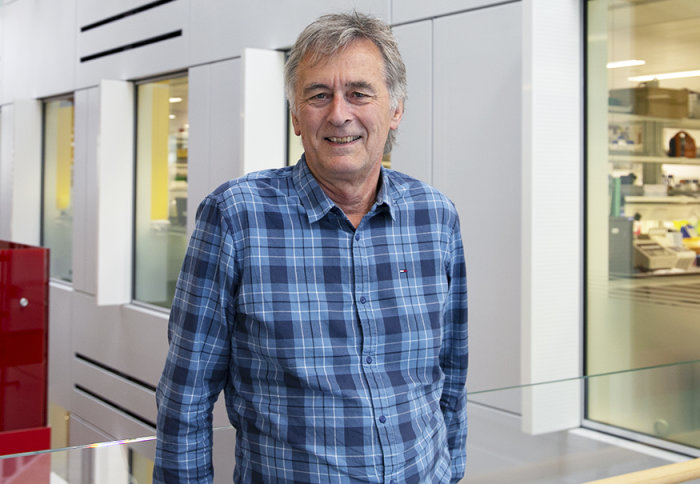Professor David Lane retires after 40 years of service at Imperial

Internationally renowned haematologist Professor David Lane is retiring this month after over 40 successful years at the College.
Since joining Imperial’s Charing Cross Campus in 1979 as a Lecturer, Professor Lane has established himself as a leading expert in the field of haemostasis and thrombosis. With an extensive body of published work, an impressive track record of grant successes and a Distinguished Career Award from the International Society on Thrombosis and Haemostasis, it’s safe to say that Professor Lane’s academic legacy is assured. But when asked about the proudest achievement of his career, it’s a case of none of the above.
“The most rewarding thing has been developing the careers of the postdocs, Clinical Fellows and students I’ve worked with. Helping talented individuals to move on to bigger and better things can be fantastically rewarding.”
In his role as a supervisor to a total of 24 PhD students, and in establishing Imperial’s BSc course in Haematology with colleague Professor Barbara Bain, it’s clear that Professor Lane has always been dedicated to fostering the next generation of talent.
“Teaching and mentoring have been a very gratifying part of my career. It’s been an incredibly meaningful experience to help young people and to see them develop their skills.”
From physics to physiology and beyond
Reflecting on his own experiences as a PhD student and early career researcher, Professor Lane recalls how his career has been bolstered by numerous mentors who supported his sense of academic curiosity.
“I left university in 1970 with an undergraduate degree in physics from the University of Essex. I always wanted to do something academic, but I wasn’t quite sure what it was. I declined the offer of doing a physics PhD – I didn’t feel as though it suited me, and I wanted a change.”
After a year-long stint as an animal technician at St Mary’s Hospital, Professor Lane was offered the chance to undertake a PhD on techniques of measuring blood flow, marking his first step into the field of haematology.
“At the end of my PhD, I was hungry to learn more techniques and I secured an unpaid internship with Patrick Gaffney, whose work I had read and become more and more interested in during my studies. I worked with him for three months at an MRC Institute in Hampstead, working day and night because I was so fascinated by the research.”
“He happened to have connections with an ambitious vascular surgeon, Vijay Kakkar, who was in the process of setting up the first Thrombosis Research Unit at King’s College London. Seeing how enthusiastic I was about the work, he offered me an MRC-funded postdoc position there, which is really how I got into my area of research.”
“I did my postdoc during a really interesting time – both clinically and scientifically – and it positioned me quite well in terms of allowing me to publish papers and practice writing grant applications. After five years, I was able to successfully apply for a Lecturer position at Charing Cross Medical School.”
Then and now
"Academia can be very fulfilling, but it is also very much a rejection game: you have to keep positive and keep trying – don’t give up." Professor David Lane
Looking back on his academic beginnings, it’s clear to Professor Lane that his experiences as a PhD student and postdoc are markedly different from those of early career researchers today.
“There is so much more competition for funding now; people have to be so resilient.”
“The advice I give to students and postdocs is that they have to be prepared for disappointments. Academia can be very fulfilling, but it is also very much a rejection game: you have to keep positive and keep trying – don’t give up.”
“Imperial is often seen as a tough place to work. However, in my experience, I think the College is increasingly providing more opportunities for people to find support, and to learn how to sell themselves and their work in order to succeed.”
And, as a member of the College community for the past forty years, Professor Lane has seen first-hand how Medicine at Imperial and the university’s ethos has evolved.
“The merger of the Charing Cross and Westminster Medical School with Imperial in 1997 was one of the biggest influences on me and my career. It was a tremendous change in many ways, but specifically with respect to the collision of two very different working cultures. In comparison to Charing Cross, Imperial had much higher expectations.”
“However, over the years, I think the human side of the College has become more and more visible. There’s also better support provided to staff by the College, and I think the leadership has done a great job to improve communications and bring people together from across the organisation.”
After years of getting to grips with Imperial’s size, complexity and constant evolution, Professor Lane has only now been able to step back and consider what the College means to him.
“Everyone wants to belong – but it often takes a very long time to feel that in a big organisation like Imperial. It has occurred to me as I’ve approached retiring that when I step onto campus, I really do feel very much at home here.”
Article text (excluding photos or graphics) © Imperial College London.
Photos and graphics subject to third party copyright used with permission or © Imperial College London.
Reporter
Ms Genevieve Timmins
Academic Services